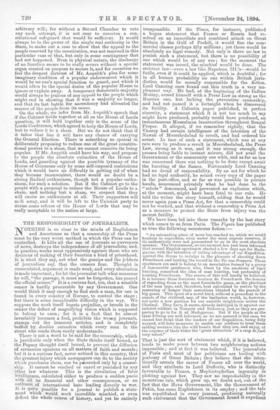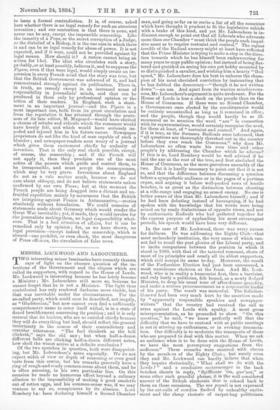THE RESPONSIBILITY OF JOURNALISTS.
NOTHING is so clear to the minds of Englishmen IA and Americans as that a censorship of the Press must be the very worst method in which the Press can be controlled. It kills all the use of journals as purveyors of news, destroys the independence of all journalists, and, in practice, works most oppressively against those who are desirous of making of their function a kind of priesthood. It is what they say, not what the gossips and the jobbers of journalism say, that the censors fear. Thought is emasculated, argument is made weak, and every aberration is made important for let the journalist talk what nonsense he will, "the passage, it must not be forgotten, has passed the official censor." It is a curious fact, too, that a sensible censor is hardly procurable by any Government. One would think it easy enough to find such a man, for one is found in every country of Europe, to control the stage ; but there is some inexplicable difficulty in the way. We suppose the work itself begets prejudice, or breeds in the censor the defect of magnifying vision which is supposed to belong to oxen ; for it is a fact that he almost invariably becomes a fool, prohibits the wrong journals, stamps out the innocent articles, and is completely baffled by doubles entendres which every man in the street who reads them easily understands.
There is not a word to be said for the censorship, which is justifiable only when the State thinks itself bound, as the Papacy thought itself bound, to prevent the diffusion of erroneous opinions on all matters of faith and morals ; but it is a curious fact, never noticed in this country, that the greatest injury which newspapers can do to the society which purchases them, can be prevented only by a censor- ship. It cannot be reached or cured or punished by any other law whatever. This is the circulation of false intelligence, calculated either to produce a sudden panic with all its financial and other consequences, or an outburst of international hate leading directly to war. It is quite possible for a journal to publish a state- ment which would work incredible mischief, or even deflect the whole course of history, and yet be entirely irresponsible. If the Times, for instance, published a bogus statement that France or Russia had re- solved on an immediate and combined attack on Great Britain in the Gulf of Pechili, it would fine the com- mercial classes perhaps fifty millions ; yet there would be absolutely no legal remedy. Not only is there no law to punish such a statement, but there is no possibility of one which would be of any use ; for the moment the statement was issued, the mischief would be done. The strictest law--even a law like Napoleon III.'s—would be futile, even if it could be applied, which is doubtful ; for in all human probability no one within British juris- diction would be morally responsible for the fiction. Lord Canning once found out this truth in a very un- pleasant way. He had, at the beginning of the Indian Mutiny, armed himself with a Press Law as strong as the Russian one, but lacking the preventive censorship, and had not passed it a fortnight when he discovered its futility. A Calcutta paper published, in perfect sincerity, a statement which it is not too much to say might have produced, probably would have produced, an instantaneous Mussulman insurrection throughout Bengal Proper. It alleged, if we remember rightly, that the Viceroy had certain intelligence of the intention of the Nawab of Moorshedabad to revolt, and had ordered his arrest. In face of such a statement, which was at any rate sure to produce a revolt in Moorshedabad, the Press Law, strong as it was, and it was strong enough, the presses being liable to instant seizure, did not avail the Government or the community one whit, and as far as law was concerned there was nothing to be done except await the bursting of the flames. Fortunately Lord Canning had no dread of responsibility. By an act for which he had no legal authority, he seized every copy of the paper in the post-office, and so far as was possible in private hands, announced privately what he had done to the " rebels " denounced, and prevented an explosion which, at the moment, might have been fatal to our rule. He told the writer the story himself, adding that he would never again pass a Press Act, for that a censorship could not be worked, and that without a censorship a Press Act as a measure to protect the State from injury was the merest futility. We have been led into these remarks by the last story which comes to us from Paris. The Figaro has published as true the following monstrous fiction:— " An astounding piece of news has reached us, which we would hesitate to reproduce, even under the most express reserves, if its authenticity were not guaranteed to us in the most absolute manner. The Government, we are assured, has just been informed that several English sportsmen started a few days ago for Mada- gascar, with the intention of taking advantage of our Expedition against the Hovas to indulge in the pleasure of shooting down Frenchmen and beating the record in the Tir aus Francais. These sportsmen are said to belong to an association formed by a group of honourable gentlemen who, biases by the emotions of tiger hunting, conceived the idea of man hunting, but preferably of hunting Frenchmen. The reason of this will hardly be believed. It is because these ferocious maniacs do Frenchmen the honour of regarding them as the most formidable game.. as the pluckiest of the man type, and, therefore, best calculated to revive by the seasoning of danger their sensations blunted by the pursuit of big game. This sport of a novel kind, without a precedent in the annals of the civilised, nay, of the barbarian world, is, however, not quite a new pastime for our amiable neighbours across the Channel. They have, it seems, already indulged in it against our isolated soldiers in Tonquin and Dahomey, just as they are pre- paring to go in for it at Madagascar. But if the people at the Quai d'Orsay are well informed, as we are assured is the case, we cannot but think that the leaders of our Expedition, being duly warned, will take measures to enable our soldiers to treat these raiding maniacs like the wild beasts that they are, and enjoy, at the expense of their bides the ' great attraction' of a coup de _Nail very select."
That is just the sort of statement which, if it is believed, tends to make peace between two neighbouring nations impossible ; and at first it was believed. The journalists of Paris and most of her politicians are boiling with jealousy of Great Britain; they believe that she inten- tionally arrests the career of France all over the world, and they attribute to Lord Dufferin, who is distinctly favourable to France, a Mephistophelian ingenuity in plotting against her. They saw no improbability in the monstrous tale, which grew up, we doubt not, out of the fact that the Hove. Government, like the Government of Pekin, has some Englishmen in its employ ; and the tale was republished in every journal, producing naturally such excitement that the Government found it expedient to issue a formal contradiction. It is, of course, asked here whether there is no legal remedy for such an atrocious invention ; and our contention is that there is none, and never can be any, except the impossible censorship. Like the insanity of a Pope, or the secret corruption of a Judge, or the disbelief of a Bishop, it is the one case in which there is and can be no legal remedy for abuse of power. It is not expected, and if it were, could not be provided against by legal means. How should it ? A nation cannot bring an action for libel. The idiot who circulates such a story, probably, or at least possibly, believes it, and to suppress the Figaro, even if that were legal, would simply create an im- pression in every French mind that the story was true, but that the British Government was ashamed of it, and had remonstrated strongly against its publication. There is, in truth, no remedy except in an increased sense of responsibility in journalists' minds, and that can be produced in them only by professional opinion or the action of their readers. In England, such a state- ment in an important journal—and the Figaro is a most important one, both from its great circulation and from the reputation it has attained through the acute- ness of its late editor, M. Magnard—would have elicited a chorus of rebuke and ridicule which the romancer would have keenly felt, and which would have seriously im- peded and injured him in his future career. Newspaper proprietors do not like the kind of man capable of such a blunder ; and newspaper-readers soon weary of a journal which gives them excitement chiefly by audacity of invention. That is the only real check possible, except, of course, the censorship ; and if the French will not apply it, then they proclaim one of the most active of the powers which guide and control them, to be irresponsible, and must accept the consequences, which may be very grave. Inventions about England do not as a rule matter much, because we do not care about obloquy, and do not believe statements unless confirmed by our own Press ; but at this moment the French people are being dragged into a distant and un- fruitful expedition mainly by assurances that the British are intriguing against France in Antananarivo,—stories absolutely without foundation. We could conceive of statements made about Germany which would render the Great War inevitable ; yet, if made, they would involve for -the journalists making them, no legal responsibility what- ever. That is a bad situation of affairs, but it can be remedied only by opinion ; for, as we have shown, no legal provision--except indeed the censorship, which is absurd—can prohibit, or even check, the most dangerous of Press offences, the circulation of false news.







































 Previous page
Previous page